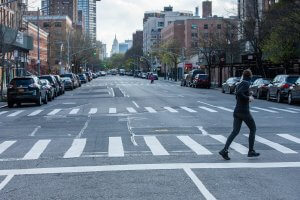
COVID-19 has altered how people live, especially in hard hit areas such as New York City. Photo @Wikimedia Commons.
The COVID-19 pandemic has altered day-to-day life and greatly impacted how people socialize, work, go to school, and more including how people engage with public transportation. Researchers at UTC partner school Columbia University are beginning to research technological innovations that could help better prepare cities for future disruptions.
Columbia University recently announced 10 faculty teams that were each awarded $85,000 to develop innovative technology for New York City and urban areas dealing with COVID-19. An affiliated researcher at Rutgers Center for Advanced Infrastructure and Transportation (CAIT), Dr. Sharon Di was among one of those faculty teams selected.
Her team’s proposal, “Real-Time Crowd Management to Prepare Subway Stations for Future Pandemics,” intends to develop a crowd management system that can help ensure public transit systems are better prepared for future pandemics, according to the Columbia University announcement.
By leveraging sensing, data science, and digital twins, the research team hopes to develop solutions to problems with real-time crowd management during the pandemic that will help to mitigate risk and ease public fears.
According to Columbia University, the funding for this Urban Living Tech Innovations initiative supports cross-disciplinary research including artificial intelligence, design thinking, and more that will help to develop new technologies. Each research team will include collaborators from across the university as well.

Public transit systems have had to adapt to keep travel safe during the pandemic. Photo @Wikimedia Commons.
For this particular project, researchers will bridge engineering concepts with those of indoor pedestrian mobility, epidemiology, and travel behavior, with the goal of reshaping public transport mobility during the pandemic.
In related work, CAIT previously announced a survey led by Dr. Di that sought to better understand people’s travel pattern changes before and after the pandemic to ultimately help improve transit service. This knowledge can help researchers, policymakers, and planners to better understand new travel needs and begin to improve on existing transportation infrastructure and service.
“The COVID-19 crisis has dramatically altered the flow of everyday living—from work, education, and transportation to food, entertainment, and health and services—challenging us to rethink many aspects around the design, infrastructure, and functionality of our cities,” said Columbia Engineering Dean Mary Boyce in the Columbia University announcement. “Urban centers like New York, including our Columbia campus, require a wide range of innovations as we reemerge into a new “normal” and a resilient future. The greatness of New York City coupled with innovative minds across Columbia is a winning team and we are deeply appreciative of our donor’s generosity in helping us to ignite this passion.”

